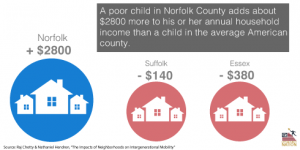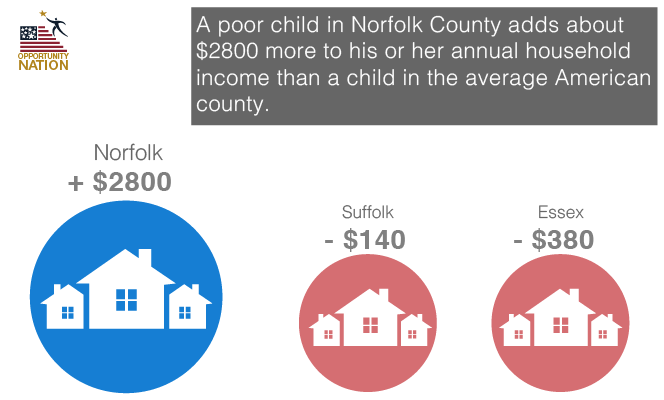Zip Code Matters: Better Neighborhoods Lead to Better Outcomes
 •
•
The latest research from Harvard economist Raj Chetty and The Equality of Opportunity project is a game-changer in the evolving conversation about how to expand the American Dream.
Our cross-sector, national, bipartisan campaign believes that the zip code of one’s birth should not condemn anyone to an inescapable economic fate in the United States. Yet too often, this is the case.
Chetty’s groundbreaking study looks at where low-income children who moved to better neighborhoods through a federal voucher program two decades ago ended up. The results:
- Children who moved from poor neighborhoods into more affluent ones had far better outcomes than their peers who remained behind.
- The earlier the children were moved, the better the outcome.
- In fact, every year spent in a better environment improved the children’s chance of success.
 Source: Raj Chetty and Nathaniel Hendren, “The Impacts of Neighborhoods on Intergeneration
Source: Raj Chetty and Nathaniel Hendren, “The Impacts of Neighborhoods on Intergeneration
Like the Opportunity Index which measures 16 key economic, educational and civic factors across 50 states and 2,600 counties, The Equality of Opportunity project highlights geography, and supports the belief that communities are key to the expansion of opportunity.
“The broader lesson of our analysis,” Chetty and his team write, “is that social mobility should be tackled at a local level.”
Chetty and his team working have identified several factors present in places with higher levels of economic mobility: less segregation by income and race; lower levels of income inequality; better schools; lower rates of violent crime; higher levels of social capital and civic engagement; and a larger share of two-parent households.
Many of these factors are also tracked by the Opportunity Index: income; inequality; data that tracks with school quality such as high school graduation rates; crime rates; and civic engagement, as measured by volunteerism and group membership.
Index data and analyses also show that communities with higher levels of civic engagement have lower levels of youth disconnection, greater economic opportunity and less income inequality.
Chetty’s new research also validates the work of our coalition and empowers us all to act, as it proves something we all knew. “We can do something about upward mobility,” Chetty told the New York Times. Place isn’t the only factor that matters. Policies and programs also matter, a lot.









